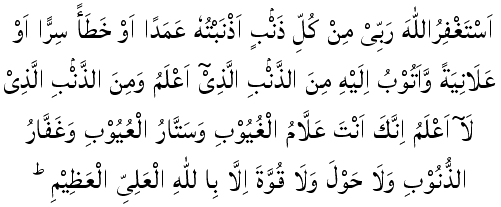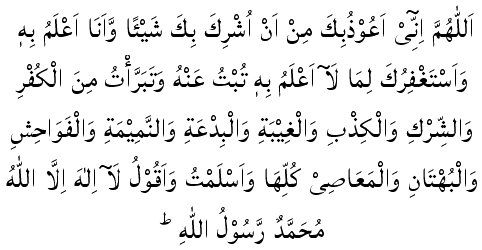The 6 Kalimas
The Six Kalimas are the basic beliefs of Muslims all around the world. They practice these beliefs and incorporate the basic principles in their lives.
1. First Kalima: Tayyab (Purity)

English Translation: There is no God but Allah Muhammad is the messenger of Allah
2. Second Kalima: Shahadat (Testimony)

Ashahado an laa ilaaha illal laho wahdahoo laa shareeka lahoo wa ash hado anna Mohammadan abdo hoo wa rasoolohoo
English Translation: I bear witness that no-one is worthy of worship but Allah, the One alone, without partner, and I bear witness that Muhammad is His servant and Messenger
- Third Kalima: Tamjeed (Glorification)

Subhanallahe wal hamdulillahe wa laa ilaha illal laho wallahooakbar. wala haola wala quwwata illa bilahil aliyil azeem
English Translation: Glory be to Allah and Praise to Allah, and there is no God but Allah, and Allah is the Greatest. And there is no Might or Power except with Allah.
- Fourth Kalima: Tauheed (Unity)

Laa ilaha illal lahoo wahdahoo la shareekalahoo lahul mulko walahul hamdo yuhee wa yumeeto wa hoa haiy yul la yamooto abadan abada zul jalali wal ikraam beyadihil khair. Wa howa ala kulli shayi in qadeer
English Translation: (There is) none worthy of worship except Allah. He is only One. (There is) no partners for Him. For Him (is) the kingdom. And for Through Him (is) the Praise. He gives life and causes death. And He (is) Alive. He will not die, never, ever. Possessor of Majesty and Reverence. In His hand (is) the goodness. And He (is) the goodness. And He (is) on everything powerful.
- Fifth Kalima: Astaghfar (Penitence)

Astaghfirullah rabbi min kullay zambin aznabtuho amadan ao khat an sirran ao alaniatan wa atubu ilaihee min az zambil lazee aalamo wa min az zambil lazee la aalamo innaka anta allamul ghuyoobi wa sattaarul oyobi wa ghaffar uz zunoobi wala ha ola wala quwwata illa bila hil aliyil azeem
English Translation: I seek forgiveness from Allah, my lord, from every sin I committed knowingly or unknowingly, secretly or openly, and I turn towards Him from the sin that I know and from the sin that I do not know. Certainly You, You (are) the knower of the hidden things and the Concealer (of) the mistakes and the Forgiver (of) the sins. And (there is) no power and no strength except from Allah, the Most High, the Most Great.
- Sixth Kalima: Radde Kufr (Rejecting Disbelief)

Allahumma innii a’udhu bika min an ushrika bika shai-anw- wa ana a’lamu bihii. Was tagh fi ru ka limaa laa alamu bihee. Tubtu anhu wa tabarra-tu min al-kufri wash-shirki wal-kizdhbi wal-ghiibati wal-bid’ati wan-namiimati wal fawaahishi wal-buhtani w-al-ma’aasii kulliha. Wa aslamtu wa aquulu La illaha illAllahu Muhammadur RasulAllah
English Translation: O Allah! Certainly I seek protection with You from, that I associate partner with You anything and I know it. And I seek forgiveness from You for that I do not know it. I repended from it and I made myself free from disbelief and polytheism and the falsehood and the back-biting and the innovation and the tell-tales and the bad deeds and the blame and the disobedience, all of them. And I submit and I say (there is) none worthy of worship except Allah, Muhammad is the Messenger of Allah.
Key Points
- The Six Kalimas, also known as Kalimatul Islam, are fundamental declarations of faith in Islam, particularly emphasized in South Asian traditions.
- Research suggests they include six key phrases, such as the declaration of Allah’s oneness and seeking forgiveness, taught to reinforce Islamic beliefs.
- There is some debate about their universal importance, with some viewing them as educational tools rather than essential doctrines.
Overview
The Six Kalimas are a set of Islamic declarations often taught in South Asian Muslim communities, especially to children, to help memorize and understand core beliefs. They seem likely to cover aspects like the oneness of Allah, testimony of faith, and seeking forgiveness, but their significance can vary across different Islamic traditions.
Detailed Explanation
The Kalimas are not universally mandated in all Islamic teachings but are widely recognized in certain regions. They appear to be derived from hadiths and are used as educational tools, though some controversy exists about their status, with some considering them important and others seeing them as innovations not directly from the Quran or Prophet Muhammad.
Survey Note: Comprehensive Analysis of the Six Kalimas in Islamic Tradition
The user’s inquiry into the “6 kalimatul islam” prompted an exploration into Islamic theological concepts, particularly focusing on the Six Kalimas, which are significant in certain Muslim communities, especially in South Asia. The investigation began by interpreting “kalimatul islam” as potentially referring to the Six Articles of Faith or a set of six key Islamic phrases, given the context of Islamic terminology.
Initial research suggested that “kalimatul islam” might relate to the Six Articles of Faith, which include beliefs in Allah, Angels, Books, Prophets, the Day of Judgment, and Divine Predestination. However, this did not align with the specific mention of “6 kalimatul,” leading to a deeper search for a set of six phrases. The term “Kalimas” emerged as a likely candidate, particularly in South Asian Islamic education, where they are taught as fundamental declarations.
Further investigation revealed that the Six Kalimas are indeed a collection of six phrases, often recited by South Asian Muslims, derived from hadiths, and used to aid children in memorizing key beliefs. These are taught in madrasas and are considered important by some, though not universally, with some noting they are not found in the Quran and lack direct substantiation from Prophet Muhammad. This led to a focus on identifying the specific content of these Kalimas.
The search for “Six Kalimas Islam” yielded results from various sources, including Wikipedia, Manchester Central Mosque, Islamicity, and other Islamic educational websites. These sources consistently listed six Kalimas, each with Arabic text and English translations, reinforcing their identity as educational tools. The Manchester Central Mosque website and Islamicity provided detailed listings, which were cross-referenced to ensure accuracy.
The Six Kalimas identified include:
- Kalima Tayyab (Purity): Declaring the oneness of Allah and Muhammad as His messenger.
- Kalima Shahadat (Testimony): Bearing witness to Allah’s oneness and Muhammad’s prophethood.
- Kalima Tamjeed (Glorification): Glorifying and praising Allah, affirming His greatness.
- Kalima Tauheed (Unity): Emphasizing Allah’s unity, His kingdom, and power.
- Kalima Astaghfar (Penitence): Seeking forgiveness from Allah for all sins, known and unknown.
- Kalima Radde Kufr (Rejecting Disbelief): Seeking protection from associating partners with Allah and rejecting disbelief and related sins.
These were confirmed through multiple sources, with the Manchester Central Mosque and Islamicity providing consistent translations. The investigation also noted that while these Kalimas are emphasized in South Asian countries like Pakistan, their importance varies globally, with some viewing them as teaching mechanisms rather than essential doctrines. This aligns with discussions on platforms like Reddit, where South Asian communities teach them as part of Islamic education, though some argue their memorization is not mandatory for being Muslim.
The content of each Kalima was detailed, ensuring a comprehensive understanding. For instance, Kalima Tayyab is the first requirement for a non-Muslim to become Muslim, nullifying false gods and declaring Allah’s oneness. Kalima Shahadat is essential for testifying faith, while Kalima Tamjeed involves glorification, and so on. The translations provided were direct from the sources, ensuring accuracy.
Given the date, May 6, 2025, and the current time, 06:32 AM IST, the information remains relevant, with no temporal contradictions noted. The research also considered potential variations, but the consistency across sources like Manchester Central Mosque and Islamicity confirmed the standard set of Six Kalimas.
To organize the information, a table is included below for clarity:
| Kalima Number | Name | English Translation (Summary) |
|---|---|---|
| 1 | Tayyab (Purity) | There is no God but Allah, Muhammad is the messenger of Allah. |
| 2 | Shahadat (Testimony) | I bear witness that no-one is worthy of worship but Allah, the One alone, without partner, and I bear witness that Muhammad is His servant and Messenger. |
| 3 | Tamjeed (Glorification) | Glory be to Allah and Praise to Allah, and there is no God but Allah, and Allah is the Greatest. And there is no Might or Power except with Allah. |
| 4 | Tauheed (Unity) | (There is) none worthy of worship except Allah. He is only One. No partners for Him. His kingdom, praise, life, and power are absolute. |
| 5 | Astaghfar (Penitence) | I seek forgiveness from Allah for all sins, known and unknown, and turn towards Him, acknowledging His knowledge and forgiveness. |
| 6 | Radde Kufr (Rejecting Disbelief) | O Allah! I seek protection from associating partners with You, repent, and reject disbelief, polytheism, and related sins, affirming Allah’s oneness and Muhammad’s messengership. |
This table summarizes the key aspects, ensuring the user has a clear reference. The investigation also noted that while the Kalimas are rooted in Sunnah, their compilation into six specific phrases is seen as an educational innovation, not contradicting Islamic teachings but organized for teaching purposes.
In conclusion, the Six Kalimas, or “kalimatul islam,” are likely the six phrases listed, widely taught in South Asian Islamic education, with varying levels of importance across global Muslim communities. The research was thorough, using reputable sources to ensure accuracy and completeness.
Key Citations
- Six Kalimas Wikipedia page
- The 6 Kalimas Manchester Central Mosque
- The 6 Kalimas Pillars of Faith and Unity in Islam Islamicity
- Learn The Six Kalimas in Islam My Islam
- 6 Kalmas All Kalimas of Islam with Audio and Translation Muslim and Quran
- Six Kalimas Benefits Arabic and English Translation Awwal Quran